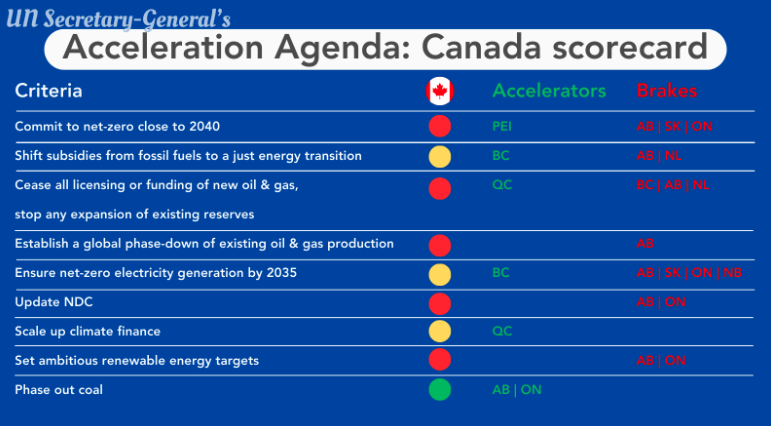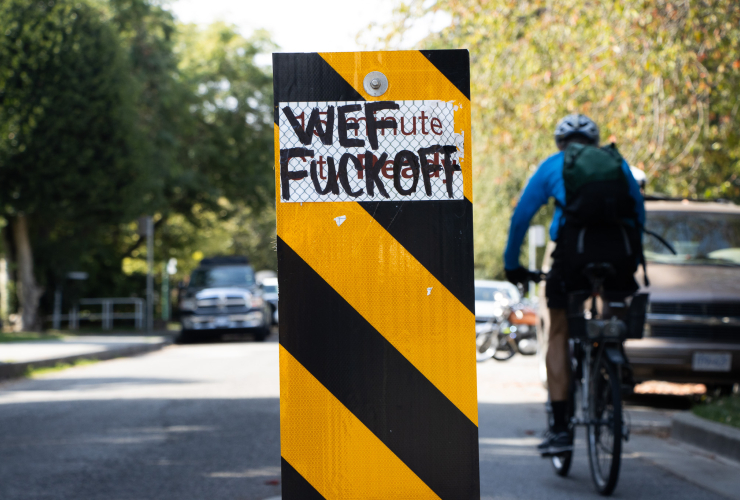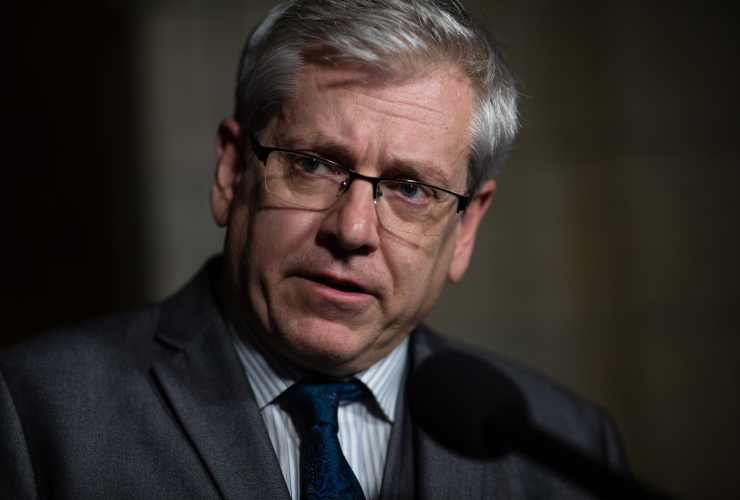Support journalism that lights the way through the climate crisis
Speaking at the Climate Ambition Summit in New York City on Wednesday, Prime Minister Justin Trudeau was grilled for Canada’s massive oil and gas expansion at a time when climate science demands fossil fuels be rapidly phased out.
United Nations Under-Secretary-General Melissa Fleming invited Trudeau to speak but before he did, she noted Canada was one of the largest expanders of fossil fuels last year and asked what Canada is doing to align with the Acceleration Agenda — a series of steps rich countries should take, which the UN says can rescue the Paris Agreement from failing like so many climate accords of the past.
The Acceleration Agenda calls for rich countries to set net-zero by 2040 targets, phase out coal power by 2030, end fossil fuel subsidies, set ambitious renewable energy targets, implement fair, equitable and just energy transitions, and for new standards of climate justice to guide decision-making.
Trudeau said he agreed with UN Secretary-General António Guterres’ call for accelerated action, not just “because the science demands it, but because of the economic opportunity.”
“Climate policy is economic policy,” he said. “As we move forward, we will continue to increase our ambition at every level,” he added.
Elsewhere in his address, Trudeau confirmed his government’s proposed cap on oil and gas sector emissions would have a “framework” finished by the end of 2023, a little over two years since he first pledged the regulations. He also announced forthcoming draft regulations to cap methane pollution, which he said would exceed Ottawa’s target of 75 per cent reductions from 2012 levels by 2030. And he said Canada was allocating $700 million to the International Monetary Fund’s Poverty Reduction and Growth Trust, to be tapped by low-income countries.
Trudeau’s speech was met with fierce opposition from climate and Indigenous rights advocates.
“When at home in so-called Canada, Trudeau provides ample lip service to nurturing relationships with Indigenous people, yet when given the opportunity to speak in international spaces, he reduces climate action to economic opportunities — and fails to acknowledge our rights at all,” said Indigenous Climate Action executive director Eriel Tchekwie Deranger in a statement.
Global policy manager with Oil Change International Romain Ioualalen said rich countries like Canada were given an opportunity to demonstrate their commitment to the Paris Agreement, but “instead we saw cowardice and a staggering failure of climate leadership.”
“The U.S., Canada, Australia, the U.K., and Norway, responsible for a majority of planned oil and gas extraction, either arrived empty-handed or failed to attend altogether,” he said in a statement. “This is a slap in the face of the more than 600,000 people who marched on all [seven] continents last weekend.”
A recent study from Oil Change International found Canada is on track to be the second-largest fossil fuel expander, behind the United States, by 2050. On its own, Canada’s planned fossil fuel expansion represents 10 per cent of the world’s expansion plans, creating the equivalent greenhouse gas emissions of 117 coal plants run for decades.

Ahead of the summit, Climate Action Network Canada analyzed how close the federal and provincial governments are to reaching the Acceleration Agenda’s targets, revealing the jurisdictions furthest from the goals. While some provinces like British Columbia, Quebec and Prince Edward Island already meet some of the goals, others like Alberta, Saskatchewan, Ontario and Newfoundland and Labrador remain far off-track.
It’s “not solely the federal government,” said Climate Action Network Canada senior international policy analyst Pratishtha Singh. “Provincial government co-operation [is] really needed for us to meet the goals of the Paris Agreement.”
Provincial co-operation appears unlikely. Alberta Premier Danielle Smith recently threatened to upend a working group between her province and the federal government if Ottawa advanced a cap on oil and gas sector emissions or new policies aimed at methane pollution — two policies Trudeau confirmed he plans to introduce shortly.
After a blistering summer of unprecedented heat waves, Guterres is desperate for climate action and is using this week’s summit to up the pressure on rich countries like Canada ahead of tense climate talks at the UN’s annual climate negotiations later this year at COP28.
“Humanity has opened the gates to hell,” Guterres told world leaders Wednesday. Without rapidly phasing out fossil fuels, the world is on a path to warming of 2.8 C — a “dangerous and unstable world,” he said.
“If we are to meet the 1.5-degree limit and protect ourselves from climate extremes, climate champions, particularly in the developing world, need solidarity,” Guterres said. Solidarity, he explained, means financial support and for rich countries to cut greenhouse gas emissions. “We must make up time lost to foot-dragging, arm-twisting and the naked greed of entrenched interests raking in billions from fossil fuels.”
As much as I will never vote
As much as I will never vote for the Corruption Paty of Canada and in particular with the snake oil salesman, Pierre Poilievre at the helm, to save the Liberal party, Justin Trudeau needs to step aside and usher in a new leader before the next election. Trudeau talks the talks, but has undermined any climate change actions taken to date. In addition, any effort to meet our targets is being undermined by conservative premiers in Alberta, Saskatchewan and Ontario for the most part.
The Liberals need a leader who isn't afraid to get the job done and challenge the conservative party on their failure to acknowledge that climate change is real. Canada has become a laughing stock of the world with the lack of real progress. Sure, the Feds release statistics saying we are doing well, but that is just cherry-picking numbers to look good, but are far from reality. Canada is failing to even stem the flow of CO2 or reducing fossil fuel usage, instead increased both.
I totally agree with John,
I totally agree with John, that the Liberal party needs to change the party leader. Trudeau is now a liability, both to the Liberal party as well as Canada's Just Transition away from fossil fuels. I think their are a number of Liberal MPs that are suitable for the top job. In particular I like the young, progressive MP in the BC riding of West Vancouver - Sunshine Coast - Sea to Sky, Patrick Weiler.
I don't think the rest of the
I don't think the rest of the world is laughing at us. I think they're spitting mad. FWIW, I'm angry too, at the utter intransigience of our leaders, banks and insurance companies.
People speak of "climate depression" and "climate anxiety." I don't have either of those: I'm just really, really p*ssed off that things are continuing to go as they've been going since 1990: more and more of the same. Despite what our citizens/residents have made clear is their choice.
Democracy my royal Canadian arse.
Climate action agenda ditto.
Someone who can get Trudeau's ear, please tell him that even the government's count/estimates of emissions is unjustifiably low-balled, and it's time to pull his head out of the sand, get his fist out of the pockets of fossil fuel companies, and get on with the job he was elected to do.
The call for Trudeau to step
The call for Trudeau to step aside as leader of the Liberals has so far had no effect on The Kid. He seems to have the confidence of the elected cabinet and caucus and party membership. As such there is no guarantee that switching one face for another ar the top will stop the weak two-faced approach on climate, unless the fresh face chooses to fight internally. The best candidate will find a way to persuade her/his peers without stabbing anyone in the back, but given the insecurity rampant in elected personalities, I have my doubts that is possible.
The best winning format would be, of course, offering one and only one alternative to the Conservatives to voters. Canada is not and never will be a majority conservative nation. Moderate and progressive voters have always outnumbered hard minded conservative citizens by a third.
In a perfect world, parties would not be filled to overflowing with politicos who place their personal ego and ideology (no matter where the credibility of its content rests) above the common good of the nation. But obviously that's not the Canadian way.
A coalition of Liberals, New Democrats and Greens (possibly even the Bloc with equitable policy intent) will not only decimate the Conservatives in every election, but will allow moderates and progressives in urban ridings in traditionally Conservative jurisdictions a chance to be recognized in the national government.
It will also eliminate vote splitting in competitive ridings, a fact of life that is routinely dismissed by critics who build extensive lists of individual political party sins and goad progressives to ignore the split riding math and vote on principles that will only be defeated election after election, decade after decade.
Until arties containing moderates and progressives develop the strength of character to unite, even if for just one or two elections, and therein create the wonderful opportunity push through decent and credible climate and social justice policies and give the public a fair chance to fully democratize the electoral system, it's the status quo all the way.
This is the same Liberal Govt
This is the same Liberal Govt that declared a climate emergency one day and approved the TMX pipeline expansion the next.
Climate leaders don't build pipelines, much less buy them. You don't build oilsands export pipelines unless you are banking on climate disaster.
Climate Action Tracker's 2022 report rates Canada's efforts overall as "highly insufficient". Same rating since 2011 -- in every year but one.
"Canada is a continually bad actor on the global stage, despite protests that Justin Trudeau is ruining the oilsands. Drawing on research from Quebec's French-language newspaper Le Devoir, the New Democratic Party has argued Trudeau has been kinder to Big Oil than Stephen Harper ever was. He has also been crueller to the most vulnerable."
"Oil and gas approvals spell ecocide" (National Observer, Aug 18 2023)
When the IPCC issued its latest report, then-Environment Minister "Wilkinson reaffirmed Canada's commitment to phasing out fossil fuels and achieving net zero carbon emissions by 2050, but said achieving that target will require money generated by fossil fuels."
"Ottawa says it needs revenue generated by the Trans Mountain pipeline to fight climate change" (CBC, 9-Aug-21)
"[Liberal MP] Qualtrough says the pipeline is a 'transitionary tool' that will help fund Canada's shift to a more climate-friendly economy." (The Tyee, 2021)
Then-Natural Resources Minister Jim Carr: "Our plan is to use this time of transition to Canada's advantage by building the infrastructure to get our resources to global markets and using the revenues to invest in clean forms of energy." (2018)
"[Liberal MP] Qualtrough says the pipeline is a 'transitionary tool' that will help fund Canada's shift to a more climate-friendly economy."
Doubling down on fossil fuels in the face of climate change is insanity.
Canada does not need fossil fuel dollars to fund the transition. Like selling cigarettes to cure lung cancer. If Trudeau has billions of (our) dollars for pipelines, he has billions of dollars for renewables.
Transitions start by moving in the direction you wish to travel. Doubling down on fossil fuels takes us in the wrong direction. Building fossil-fuel infrastructure locks us into a fossil-fuel future. When you're in a hole, stop digging.
Trudeau (2016): "There is growth to be had in the oilsands. They will be developing more fossil fuels while there's a market for it, while we transition off fossil fuels."
Trudeau (2017): "No country would find 173 billion barrels of oil in the ground and just leave them there."
If Trudeau still believes that in 2023, he should have the integrity to say so loud and clear at the climate summit, so the whole world can hear.
"[Trudeau] also announced
"[Trudeau] also announced forthcoming draft regulations to cap methane pollution, which he said would exceed Ottawa’s target of 75 per cent reductions from 2012 levels by 2030."
Canada's O&G industry grossly underreports its emissions. Better fix that first.
Amen.
Amen.
I note also that while the call for acceleration means net zero by 2040, Trudeau is still fixated on 2050.
We have, of course, no reason to find 2050 credible, considering that his people have calculated that that sow's ear of an investment wll break even in only 100 years.
Frankly, it's pushing a
Frankly, it's pushing a decade since Trudeau was first elected. Methinks "transition" years are over: it's time to buckle down and deal with the issue head on.
This is an opportunity for
This is an opportunity for the NDP to step up its act. They need to find credible candidates to run in the nation's competitive ridings as viable alternatives to the Libs.
Numbers don't lie. Cold math is heartless. Voting to punish the Libs in three-way ridings is pure action-reaction game playing based on emotion. If that's how it plays out next election, then hello prime Minister Poilievre.
The NDP need to seize this opportunity to develop a deeper and more focussed intelligent critical stance on Trudeau's weak climate responses and hypocritical promotion of oil and gas while concurrently building up their own credibility at the riding level long before an election is called.
To date, the only discussion of a formal Liberal Democrat coalition (even one with a negotiated expiry date as a sop to party executive hacks) is in the comments sections of progressive journals like this one.
This is the only way to harmonize climate and social democratic principles with the reality of cold electoral math in the multi-party ridings that will make or break a national government in a winner-takes-all electoral system.
I've come to the conclusion
I've come to the conclusion that Canada will be unable to reduce emissions and transition to a green new world unless we first change our electoral/governing system. Let's only vote for a candidate/party that will guarantee electoral reform, preferably some form of Proportional Representation. This is our best chance at a democratic government structure that will make good things happen. I lost faith in the Liberals shortly after the 2015 election when they dropped the ball on ER / PR that they had promised - Although they have a couple of years to reconsider and make it happen!
Dear Mark: Achieving PR in
Dear Mark: Achieving PR in Canada is a long and on-going struggle. The current strategy is to seek establishment of a Citizens' Assembly. Join the fight at https://www.fairvote.ca.
For such a coalition, there
For such a coalition, there needs to be a sufficiency of seats won -- and that takes some parties standing down in ridings, to accomplish that goal. That's the cold electoral math beneath the arithmetic of wins & losses.
It's not true that Canada's wasn't ever a majority Conservative electorate. Just not a neo-Conservative electorate.






Comments